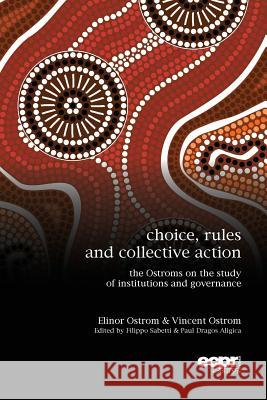Choice, Rules and Collective Action: The Ostroms on the Study of Institutions and Governance » książka
Choice, Rules and Collective Action: The Ostroms on the Study of Institutions and Governance
ISBN-13: 9781910259139 / Angielski / Miękka / 2014 / 312 str.
This volume brings a set of key works by Elinor Ostrom, co-recipient of the Nobel Prize in Economic Sciences, together with those of Vincent Ostrom, one of the originators of Public Choice political economy. The two scholars introduce and expound their approaches and analytical perspectives on the study of institutions and governance. The book puts together works representing the main analytical and conceptual vehicles articulated by the Ostroms to create the Bloomington School of public choice and institutional theory. Their endeavours sought to 're-establish the priority of theory over data collection and analysis', and to better integrate theory and practice. These efforts are illustrated via selected texts, organised around three themes: the political economy and public choice roots of their work in creating a distinct branch of political economy; the evolutionary nature of their work that led them to go beyond mainstream public choice, thereby enriching the public choice tradition itself; and, finally, the foundational and epistemological dimensions and implications of their work
This volume brings a set of key works by Elinor Ostrom, co-recipient of the Nobel Prize in Economic Sciences, together with those of Vincent Ostrom, one of the originators of Public Choice political economy. The two scholars introduce and expound their approaches and analytical perspectives on the study of institutions and governance. The book puts together works representing the main analytical and conceptual vehicles articulated by the Ostroms to create the Bloomington School of public choice and institutional theory. Their endeavours sought to re-establish the priority of theory over data collection and analysis, and to better integrate theory and practice. These efforts are illustrated via selected texts, organised around three themes: the political economy and public choice roots of their work in creating a distinct branch of political economy; the evolutionary nature of their work that led them to go beyond mainstream public choice, thereby enriching the public choice tradition itself; and, finally, the foundational and epistemological dimensions and implications of their work. This is a wonderful collection of the writings of two of our most distinguished colleagues in political science. Lin and Vince Ostrom have been an inspiration to many of us. While they will be missed, they will also be remembered, in no small measure because of their voluminous research corpus ? a portion of which is collected here.Kenneth A Shepsle, George Markham Professor of Government, Harvard University Vincent and Elinor Ostrom are monumental pioneers in political theory and modern institutional analysis. Complexity and the emergence of self-governing systems commanded their attention long before these became topical issues in current political science, public administration and policy analysis. This intelligently crafted and knowledgeable selection of celebrated articles and impactful essays represents a systematic insight into the foundations and development of a Nobel Prize-winning body of knowledge. It does full justice to two people who devoted their entire life to advance the study and understanding of sustained democratic governance without state - and perhaps even without nation.Theo Toonen, Dean of the Faculty of Technology, Policy and Management,Chair in Institutional Governance, Delft University of Technology The Ostroms polycentric view of public choice theory is expounded here by skilful juxtaposition of empirical and conceptual papers on the subject. I have read each of them before, but considering them together for the first time brought into sharp focus the theoretical and conceptual foundations for the Ostroms overall body of work. Elinor and Vincents vision is breathtaking in its scope, and the powerful expressions of it collected in this volume will inspire new generations of institutional analysts for many years to come.Michael D McGinnisProfessor of Political Science, Senior Research Fellow, and Former Director,The Vincent and Elinor Ostrom Workshop in Political Theory and Policy Analysis











